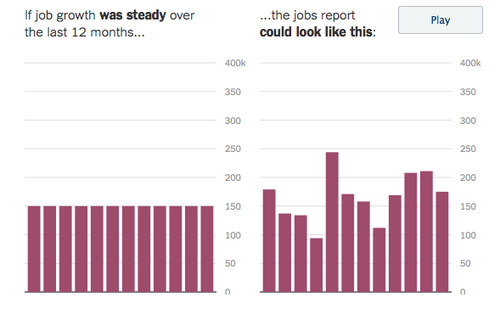Sandbox: Difference between revisions
Jump to navigation
Jump to search

| Line 4: | Line 4: | ||
by Jacob Harris, ''Source'' (opennews.org) 22 May 2014 | by Jacob Harris, ''Source'' (opennews.org) 22 May 2014 | ||
Harris identifies 6 ways to make mistakes in reporting data | |||
*Sloppy proxieson | |||
*Dichotomizing | |||
*Correlation does not equal causation | |||
*Ecological inference | |||
*Geocoding | |||
*Data naivete | |||
His principle example is a story that was widely covered in social media. It concerned but the biggest is related to "geocoding" | |||
<blockquote> | |||
What happened here was that a large percentage of IP addresses could not be resolved to an address any more specific than “USA.” When that address was geocoded, it returned a point in the centroid of the continental United States, which placed it in the state of—you guessed it—Kansas! | |||
</blockquote> | |||
<center>[[File:JobReportSim.png | 500px]]<center> | <center>[[File:JobReportSim.png | 500px]]<center> | ||
Submitted by Paul Alper | Submitted by Paul Alper | ||
Revision as of 18:44, 2 June 2014
Politics and porn (What's the matter with Kansas?)
Distrust your data
by Jacob Harris, Source (opennews.org) 22 May 2014
Harris identifies 6 ways to make mistakes in reporting data
- Sloppy proxieson
- Dichotomizing
- Correlation does not equal causation
- Ecological inference
- Geocoding
- Data naivete
His principle example is a story that was widely covered in social media. It concerned but the biggest is related to "geocoding"
What happened here was that a large percentage of IP addresses could not be resolved to an address any more specific than “USA.” When that address was geocoded, it returned a point in the centroid of the continental United States, which placed it in the state of—you guessed it—Kansas!

Submitted by Paul Alper